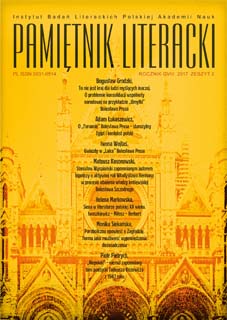Stanisław Wyspiański zapomnianym autorem hipotezy o aktywnej roli Władysława Hermana w procesie obalenia władzy królewskiej Bolesława Szczodrego
Stanisław Wyspiański as a Forgotten Author of the Hypothesis on the Active Role of Władysław I Herman in the Process of Overthrowing the Power of the King Boleslas II The Bold
Author(s): Mateusz KosonowskiSubject(s): Polish Literature
Published by: Instytut Badań Literackich Polskiej Akademii Nauk
Keywords: Stanisław Wyspiański; Boleslas II the Bold; Władysław I Herman; bishop Stanisław of Szczepanów; Wyspiański’s “Bolesław Śmiały”; Wyspiański’s “Skałka”
Summary/Abstract: The crisis of the rule of Boleslas II the Bold and the tragic death of the bishop Stanisław of Szczepanów (1079) have been and still are subjects of numerous academic investigations carried out mainly in the field of medieval studies. They have also for many years formed the fabric of artistic creation in the array of belles-lettres in which, inter alia, two Stanisław Wyspiański’s dramas, namely “Bolesław Śmiały” (“Bolesław the Bold,” 1903) and “Skałka” (“Little Rock,” 1904–1906) take the lead. The present study includes into a broader literary history discussion on the pieces of which the center of consideration is a hardly discernible to date problem of original and unique construction of the King’s brother–Władysław I Herman. The paper firstly presents the circumstances of bishop Stanisław’s death and overthrowing of Boleslas II the Bold’s power in the light of present state of art. Secondly, it insights into the then knowledge accessible about the matter and into how it was interpreted at the dawn of the 20th century when Wyspiański started the composition of his pieces. Ultimately, it describes the components of Wyspiański’s innovative artistic vision from the point of view of his acknowledged principle of artistic intuition, allowing him not only to rightly reproduce the historical processes as based on sources, but also, facing their silence, to fill the drama’s empty places with his own interpretive material. The presented method led the dramatist to give the leading role in the course of action, apart from the two anointed, the figure of Herman whom he granted an original and evolving role of one of the main instigators of Boleslas’ losing his throne. Thus, the thesis first described on the ground of history by Tadeusz Wojciechowski (1904) was earlier put forward by Wyspiański, which until now has been a hardly realizable matter.
Journal: Pamiętnik Literacki. Czasopismo kwartalne poświęcone historii i krytyce literatury polskiej
- Issue Year: 2017
- Issue No: 2
- Page Range: 73-97
- Page Count: 25
- Language: Polish

